(完整版)英语八年级下册第三单元知识点总结
(完整版)八年级英语下册Unit3知识点总结Couldyoupleasecleanyourroom

Unit3 Could you please clean your room?Peter ,could you please take out the trash?彼得,你能把垃圾倒了吗?Could you please do sth ?请你(做)......好吗?用于提出恳求,希望获得对方的必定回答,说话的语气比较客气委宛。
Could不是can的过去式,是委宛、礼貌的说法。
回答用can.【常用答语】必定回答:Sure./ Of course./ Certainly./No problem.否认回答:Sorry , I can’t2、 take out取出(v+ adv)【注】 : 跟代词做宾语,代词放中间;跟名词做宾语,可放在中间,也可放在后边His teeth hurt badly. The dentist take them out .【短语】 take out the trash倒垃圾take a walk take back回收take place发生take off 3. Can you do the dishes.?那你能够洗盘子吗?do the dishes洗碗漫步脱下;take away腾飞拿走,取走【构造 1 】 do the + 名词:do the dishes/ laundry洗餐具/衣服【构造 2 】 do the + 动词 -ing do the cleaning打扫卫生【构造 3 】 do one ’ s +名词do one ’ s housework/ homework做家务/家庭作业【构造 4 】 do some + 动词 -ing do some reading/ shopping读写书/购物Could I at least finish watching this show?起码让我看完这个节目能够吗?1】 Could I do a sth?我能够做......吗?用于表达恳求,语气比较委宛。
(完整版)初二英语下册第三单元知识点总结
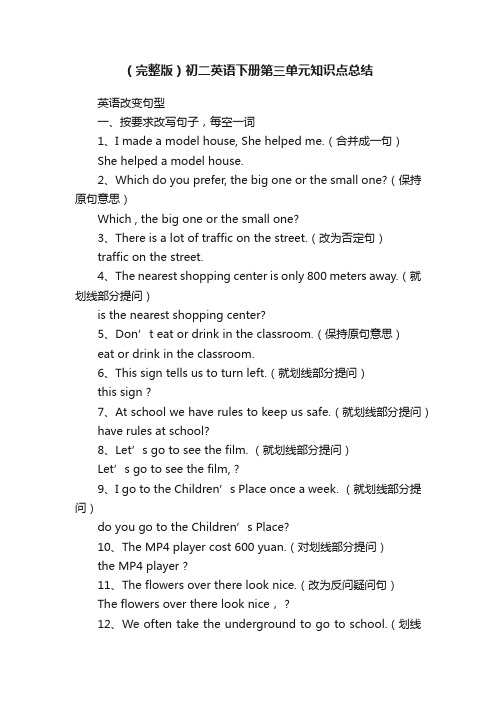
(完整版)初二英语下册第三单元知识点总结英语改变句型一、按要求改写句子,每空一词1、I made a model house, She helped me.(合并成一句)She helped a model house.2、Which do you prefer, the big one or the small one?(保持原句意思)Which , the big one or the small one?3、There is a lot of traffic on the street.(改为否定句)traffic on the street.4、The nearest shopping center is only 800 meters away.(就划线部分提问)is the nearest shopping center?5、Don’t eat or drink in the classroom.(保持原句意思)eat or drink in the classroom.6、This sign tells us to turn left.(就划线部分提问)this sign ?7、At school we have rules to keep us safe.(就划线部分提问)have rules at school?8、Let’s go to see the film. (就划线部分提问)Let’s go to see the film, ?9、I go to the Children’s Place once a week. (就划线部分提问)do you go to the Children’s Place?10、The MP4 player cost 600 yuan.(对划线部分提问)the MP4 player ?11、The flowers over there look nice.(改为反问疑问句)The flowers over there look nice, ?12、We often take the underground to go to school.(划线提问)you often go to school?13、Do you live in the city? Do you live in the countryside?(合并成一句)Do you live the city the countryside?14、We are going to see a film this Monday.(就划线部分提问)going this Monday?15、If you want to stay healthy, you should go to bed early. (保持原句意思) Go to bed earlyHealthy.16、Of all the sports I like football best. (保持原句意思)is sport.17、Sam does a lot of homework every evening. (改为否定句)Sam homework every evening.18、Your father has been to Hongkong. (改为反问疑问句)Your father has been to Hongkong , ?19、These hot dogs cost eleven yuan. (就划线部分提问)do these hot dogs ?20、I’m selling American food. (就划线部分提问)are you selling?21、My father is a good cook. (保持原句意思)My father cooking.22、I think she is right. (改为否定句)I think she is .23、His father never goes to work late. (改为反问疑问句)His father never goes to work late, ?24、We shall have some fruit.(改为一般疑问句)we fruit?25、I’d like a piece of pizza. (改为一般疑问句)a piece of pizza?26、Jack may need to buy some chicken wings. (就划线部分提问)Jack to buy?27、There’s much milk in the glass. (改为否定句)milk in the glass.28、This is my watch. (保持原句意思)watch is .29、I need to interview Mr. Wang for my project. (就划线部分提问)you to interview for your project?30、We freeze the meat because it will be fresh for a long time. (就划线部分提问) you the meat?31、It’s twenty minutes’ walk from my home to our school. (就划线部分提问)from your home to your school ?32、Let’s take a picture in front of the building. (改为反问疑问句)Let’s take a picture in front of the building , .33、How do you like the book“Harry Potter”? (保持原句意思)the book“Harry Potter”?34、I liked oranges better than apples. (保持原句意思)I oranges apples.35、I like watching sports news best. (就划线部分提问)of TV programme like best?36、Tom has read some fables in the holidays. (改为否定句)Tom fables in the holidays.37、He left Shanghai the day before yesterday.(改为现在完成时)He from Shanghai two days.38、I’m leaving for New York this coming Wednesday. (就划线部分提问)leaving New York?39、His father never goes to work late. (改为反问疑问句)His father never goes to work late,?40、We have two English lessons on Friday morning. (改为否定句)We English lessons on Friday morning.41、Are you ready for the coming test? (保持原句意思)the coming test?42、I’m going on a trip to B eijing with my parents in the summer holidays. (就划线部分提问)going on a trip to Beijingin the summer holidays?43、The man is good at singing. (保持原句意思)The man singing.44、He can hardly believe that maglev runs so fast. (改为反问疑问句)He can hardly believe that maglev runs so fast, ?45、He doesn’t like winter. Neither does his sister.(合并成一句)he his sister likes winter.用所给单词的适当形式填空Don’t make so much_________(noisy)! My father is writing.Some_____________(Australia) like to camp in the coutryside at weekend. It’s v ery _________(relax) to listen to de songs.It’s very________(pleased) to meet you.City life is very _________(difference) form the country life.We must not ride bicycles here. It’s a ________(warn) sign.Why don’t we go _______(camp) this weekend?It is a _______(use) information for me,I think.A:What does this sign ______(meaning)?B:We mustn’t eat or drink here.10、Can you make your life more____________?(enjoy)11、I like living in the suburbs. It’s quiet and _______.(peace)12、People have their own way of _________.(relex)13、My uncle Jack likes _______in the suburbs.(live)14、My computer is ___________.It doesn't work now.(break)15、He used to __________when he was young.(smoking)16、Do you read newspaper _________?(regular)17、The film called “Computer War” is veay ________.(excited)18、Don’t fall ________ in class,Sam.(sleep)19、Let’s buy some food and ________ for the party.(drink)20、If you use your own head, maybe you will make_______mistakes.(few)21、Children, __________ l want to show you a wonderful picture.(first)22、Shanghai is an _________city,isn’t it?(national)23、Mrs Brown likes to take care of _______cats and dogs.(home)24、I felt very _______after the hard work.(tire)25、________, I am going to read several books during the holiday. (second)26、________,I am going to have a trip with my friends during the festival.(third)27、We had a _______ birthday party for my brother at bother at home last Sunday.(surprised)28、What ______ it is to have the party!(fun)29、Jack was very ________ with the birthday present. (prease)30、David is a friandly man , _________in the town knows him.(every)31、I look forword to _________ the film.(see)32、She got the _________fish form the shop. (freeze)33、Please stir the _______ with a spoon.(mix)34、My father owns a big _________boat. He is a fisherman.(fish)35、Let’s study the ________lesson now. (four)36、If you want to stay healthy, you should exercise__________.(regular)37、We are going to go on an _________ this weekend.(out)38、If you want to be __________,you must eat less junk food.(healthy)39、How many__________ dogs and cats are there in the town?(home)40、Children should not often eat _________food.(freeze)41、There is a ___________ sign on the wall.(direct)42、__________, you must finish it yourself. (second)43、I have a beach hut and I like_________ there.(relax)44、Is there any ________food in the fridge? (freeze)45、The weather is usually ________ here in April. (pleasure)46、We must not leave rubbish. It’s a _________ sign. (warn)47、He nodded his head in __________ ,then walked home. (silent)48、We must stop here. It’s a _________sign. (instruct)49、It’s a good habit to do morning exercise __________. (regular)50、This book is very _________ to me. (help)新目标八年级英语第三单元I. 应掌握的词组:1. babysit one’s sister 照顾妹妹2. visit one’s grandmother 看望奶奶3. spend time with friends和朋友们一起度过时光4. visit cousins 看望表弟等5. Go to sports camp 去运动野营6.go to the beach 去海滩7. go camping 去野营8. Go shopping 去买东西9. go swimming 去游泳10. go boating去划船11. go skating 去溜冰12. go walking去散步13. go climbing 去登山14. go dancing去跳舞15. go hiking 去徒步远足16. go sightseeing 去观光17. go house-hunting 去找房子18.go on a hike 徒步旅行,go bike riding 骑自行车旅行,go fishing 去钓鱼19. do some shopping 买东西20. do some washing 洗衣服21. do some cooking 作饭22. do some reading 读书23. do some speaking训练口语24. do some sewing 做缝纫活25.that sounds nice 那好极了26. at home 在家27. how about=what about ……怎么样?28. how long 多长时间29. how far 多远30. how often 多长时间一次31. how much, how many 多少32. have a good time =have fun= have a wonderful time= enjoy oneself玩得高兴,过得愉快33. show sb. Sth.=show sth. to sb.出示某物给某人看give me the book=give the book to me 给我书,pass me the cup=pass the cup to me 把杯子递给我,sell me the house=sell the house to me 把房子卖给我buy me a book =buy a book for me 给我买书,make me a cake=make a cake for me给我做蛋糕44. Ask her about her plans 向她询问她的计划ask sb. about sth.向某人询问某事45. forget to do sth. 忘记要做某事,forget doing sth. 忘记做过某事II. 应该掌握的句子:1.What are you doing for vacation? I’m babysitting my sister.假期你要做什么?我要照顾我的妹妹。
八年级英语下册第三单元笔记

八年级英语下册第三单元笔记一、重点单词。
1. rubbish.- n. 垃圾;废弃物。
例如:There is a lot of rubbish on the street.(街道上有很多垃圾。
)2. fold.- v. 折叠;对折。
如:Fold the paper in half.(把纸对折。
)3. sweep.- v. (swept, swept) 扫;打扫。
例如:I sweep the floor every day.(我每天扫地。
)4. floor.- n. 地板;地面。
如:The book is on the floor.(书在地板上。
)5. mess.- n. 杂乱;不整洁。
例如:What a mess!(多么杂乱啊!)6. throw.- v. (threw, thrown) 扔;掷。
例如:Don't throw rubbish everywhere.(不要到处扔垃圾。
)7. neither.- adv. 也不。
用于否定句中,表示前面所说的情况也适用于后者。
例如:He doesn't like apples, neither do I.(他不喜欢苹果,我也不喜欢。
)- pron. 两者都不。
例如:Neither of them is right.(他们两个都不对。
)8. shirt.- n. 衬衫。
如:This is a white shirt.(这是一件白色的衬衫。
)9. pass.- v. 给;递;走过;通过。
例如:Pass me the salt, please.(请递给我盐。
);He passed the exam.(他通过了考试。
)10. borrow.- v. 借;借用。
例如:Can I borrow your pen?(我能借用你的钢笔吗?)11. lend.- v. (lent, lent) 借给;借出。
例如:I can lend you some money.(我可以借给你一些钱。
人教部编版八年级英语下册3单元笔记重点汇总
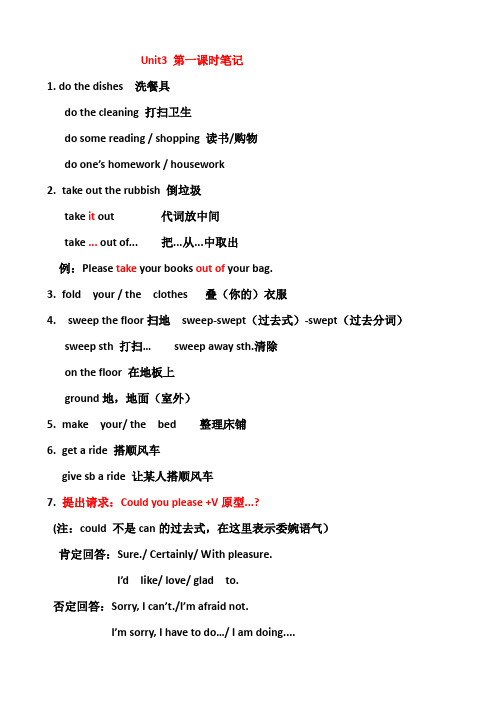
Unit3 第一课时笔记1. do the dishes 洗餐具do the cleaning 打扫卫生do some reading / shopping 读书/购物do one’s homework / housework2.take out the rubbish 倒垃圾take it out 代词放中间take ... out of... 把...从...中取出例:Please take your books out of your bag.3.fold your / the clothes 叠(你的)衣服4.sweep the floor扫地sweep-swept(过去式)-swept(过去分词)sweep sth 打扫…sweep away sth.清除on the floor 在地板上ground地,地面(室外)5.make your/ the bed 整理床铺6.get a ride 搭顺风车give sb a ride 让某人搭顺风车7.提出请求:Could you please +V原型...?(注:could 不是can的过去式,在这里表示委婉语气)肯定回答:Sure./ Certainly/ With pleasure.I’d like/ love/ glad to.否定回答:Sorry, I can’t./I’m afraid not.I’m sorry, I have to do…/ I am doing....I’d love to, but I....这个句型的否定形式:Could you please not +V原型...? 请不要...可以吗?8.征求同意:Could I …?例:Could I go out with friends, mom?肯定回答:Yes, you can./ Sure./Of course.否定回答:No, you can’t. You need to…注意:不用could回答9.work on 从事于,致力于10. help out (with something)是一个动词短语,表示在某人繁忙或是遇到困难时“给予帮助”。
英语八年级下册unit3知识点

英语八年级下册unit3知识点英语八年级下册Unit3主要是涉及到旅游及热门景点相关内容。
在这一单元中,我们学习了许多关于出行的单词和词组,同时也学习了旅游方面的文化知识。
下面,本文将围绕这些知识点,总结归纳出本单元的核心知识点。
第一部分:旅游方面的单词和词组1. sightseeing:观光2. destination:目的地3. travel,journey:旅行4. tour:游览5. accommodation:住宿6. transportation:交通7. ticket:票8. guide:导游9. excursion:短途旅游我们应该注意这些单词的正确发音和用法,使自己的英语更加准确清晰。
第二部分:旅游方面的文化知识1. 美食文化:在旅游中品尝当地的美食也是很重要的一部分。
比如在中国,烤鸭和火锅就是很受外国人欢迎的美食。
在日本,则是寿司和生鱼片。
2. 交通文化:在不同国家,交通方式也是各不相同的。
比如在欧洲,大多数人选择步行或骑行,而在中国城市,公共交通比较发达,人们通常乘坐地铁、公交车等。
3. 饮食礼仪:在不同国家,饮食礼仪也是有所不同的。
比如在中国,用餐时要招待客人,避免用筷子顶餐盘等等礼仪问题。
在日本,则更注重吃饭时的细节和仪式感。
第三部分:热门景点在这个单元中我们还学习了关于热门景点的话题。
下面介绍一些世界著名热门景点。
1. 埃菲尔铁塔:法国巴黎的标志性建筑。
2. 自由女神像:位于美国纽约港口,是法国人向美国人赠送的礼物。
3. 金门大桥:连接美国旧金山和马林县,是世界上最著名的桥梁之一。
4. 罗马斗兽场:意大利罗马的古代竞技场,是世界历史上最著名的文化遗产之一。
5. 万里长城:中国的镇国之宝,是目前世界上保存最完好、规模最宏大的古代筑墙工程。
总结:英语八年级下册Unit3,主要涉及旅游方面的单词和词组、旅游方面的文化知识和世界著名热门景点。
我们可以通过学习这些知识点,提高我们的英语交流能力,也可以更好地了解和欣赏不同国家的风土人情。
人教版八年级下册英语第三单元知识点

人教版八年级下册英语第三单元知识点Unit 3 Could you please clean your room?一、重点短语1.go out for dinner出去吃饭2.stay out late在外面待到很晚3.go to the movies去看电影4.geta ride搭车5.work on从事6.cleanand tidy干净洁7.do the dishes洗餐具8.takeout the rubbish倒垃圾9.fold your/the clothes叠衣服10.sweepthe floor扫地11.make your/the bed整理床铺12.cleanthe living room打扫客厅13.no problem没问题14.welcomesb.欢迎某人e home fro m school/work放学/下班回家16.throw down扔下17.sit down坐下eover过来19.take sb.for a walk带某人去散步20.all the time总是21.all day/evening整日/夜22.dohousework做家务23.shout back大声回应24.walkaway走开25.a comfortable home一个舒适的家26.share the housework分担家务27.get some thing to drink拿点喝的东西28.insurprise惊讶地29.watch one show观看节目30.hangout闲逛31.pass sb.sth.把某物传给某人32.lend sb.sth.把某物借给某人33.get sth.wet使某物弄湿34.hate to do sth.讨厌做某事35.help sb.to do/with sth帮助某人干某事36.do chores做杂务37.bring a tent带顶帐篷来38.buy some snacks买些小吃39.invite sb to a party邀请某人参加聚会40.go to the store去商店41.make sb.do sth使某人做某事42.enough stress足够的压力43.a waste of time浪费时间44.inorder to为了45.get goodgrades取得好成绩46.minddoing sth.介意做某事47.developchildren’s independence发展孩子的独立性48.dependon依赖49.do ones part in(doing)sth.做某人分内的事50.look after/take care of 照顾;51.finish doing sth.完成做某事二、知识点解析1.“Could you please do sth.?”的答语以下两种情况:接受请求时可以用Yes,sure./Sure./Of course./Certainly./No problem./My pleasure./It’s my pleasure./With pleasure.等来回答拒绝请求时可以用Sorry./Sorry,I can’t.等来回答,还可以用Ihave to do sth.来解释其否定句是:“Could youplease not do sth.?”2.有关“家务劳动”有关的短语:takeout the rubbish/trash倒垃圾foldone’s clothes叠衣服sweepthe floor扫地cleanthe room打扫房间makeone’s/the bed铺床dothe dishes/wash the dishes洗餐具3.throw down扔下throwat扔向,掷向throw away扔掉例题:Recycling is good,so don’t__________bottles or newspapers.A.find outB.hand ine upD.throw away4.the minute表示“一…….就……”,相当于as soon as.(引导时间状语从句)e.g.:I’ll tell himthe minute he gets there.5.常见time的短语:all the time一直,总是at times不时,有时in time及时on time按时forthe first time第一次in no time立刻at any time随时bythe time到...的时候atthe same同时have a good/great/wonderful time玩的愉快例题:---Hurry up.It’s almost time for school.---Don’t worry.We are sure to be atschool__________.A.at timesB.on timeC.all the timeD.by the time6.as….as表示“和……一样”,之间要用形容词或副词的原级。
(完整版)英语八年级下册第三单元知识点总结

(完整版)英语⼋年级下册第三单元知识点总结Unit 3. Could you please clean your room?⼀、短语动词1、take out 带出去;取出;拔出;除掉动副词组代词作宾语时必须放在两词之间。
2、come over 固定短语过来,顺便来访,拜访。
后⾯加介词to,后接表⽰地点的名词作宾语。
拓展:take out of 把---从---取出/带出3、hang →hung→hung hang out 闲逛;溜达。
4、throw down扔下;随⼿丢下其中throw可⽤作及物或不及物动词,意为扔,掷→threw→thrown拓展:throw at向----扔去(带有攻击性)throw to 扔给---(不含恶意)throw away扔掉SectionB1、take care of 照顾;照料。
相当于look after后可接名词、(反⾝)代词作宾语。
Take good care of相当于look after well2、⼆、动词⽤法1、finish 及物动词完成后跟名词、代词或动词ing形式作宾语。
拓展:与finish⼀样⽤法的动词或动词短语有:enjoy/look forward to/mind/have fun/practice/be busy/consider/feel like/give up2、pass⽤作及物动词给;递;pass sb sth =pass sth to sb把某物递给某⼈。
⾛过、通过(考试等)作不及物动词,(时间)过去,流逝3、borrow sth from sb向某⼈借某物。
⾮延续性动词Lend(lent;lent) sb sth=lend sth to sb借给某⼈某物。
⾮延续性动词Keep 由“保存”引申为“借”,延续性动词,可与时间段连⽤。
四川-----Excuse me,can I_____your pen?-----sorry,I have_____it to Bob.A.borrow;lendB.borrow;borrowedC.lend;borrowedD.lend;lent4、hate及物动词厌恶;讨厌,表⽰⼀种感情或⼼理状态,不能⽤于进⾏时态。
人教版八年级下册英语 Unit 3 单元知识点总结(含练习题及答案)
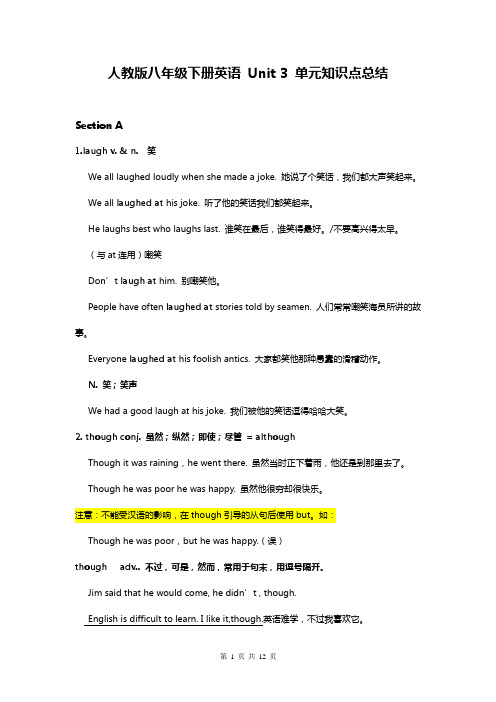
人教版八年级下册英语Unit 3 单元知识点总结Section Augh v. & n. 笑We all laughed loudly when she made a joke. 她说了个笑话,我们都大声笑起来。
We all laughed at his joke. 听了他的笑话我们都笑起来。
He laughs best who laughs last. 谁笑在最后,谁笑得最好。
/不要高兴得太早。
(与at连用)嘲笑Don’t laugh at him. 别嘲笑他。
People have often laughed at stories told by seamen. 人们常常嘲笑海员所讲的故事。
Everyone laughed at his foolish antics. 大家都笑他那种愚蠢的滑稽动作。
N. 笑;笑声We had a good laugh at his joke. 我们被他的笑话逗得哈哈大笑。
2. though conj. 虽然;纵然;即使;尽管= althoughThough it was raining,he went there. 虽然当时正下着雨,他还是到那里去了。
Though he was poor he was happy. 虽然他很穷却很快乐。
注意:不能受汉语的影响,在though引导的从句后使用but。
如:Though he was poor,but he was happy.(误)though adv.. 不过,可是,然而,常用于句末,用逗号隔开。
Jim said that he would come, he didn’t , though.English is difficult to learn. I like it,though.英语难学,不过我喜欢它。
3. quietly轻声地,安静地,平静地quiet轻声的,安静的,平静的The students walked to a quiet place.同学们向一个安静的地方走去。
八年级英语下册第三单元知识点

八年级英语下册第三单元知识点八年级英语下册第三单元知识点:重要词组及短语1.couldyoupleasedosth.?你能……吗?/请你干……好吗?2.dothechores做杂务3.dothedishes洗餐具4.sweepthefloor清扫地板5.takeoutthetrash倒垃圾6.makeone'sbed铺床7.foldone'sclothes叠衣服8.cleanthelivingroom清扫客厅9.stayoutlate晚归eover过来11.haveatest考试12.getaride搭车eone'scomputer使用某人的电脑14.hatesth./hatetodosth./hatedoingsth.讨厌某事/做某事liketodo(doing)sth.15.dothelaundry=dosomewashing=washclothes洗衣服16.makebreakfast/makedinner=dosomecooking做饭17.washthecar刷车18.workon从事,忙于workat学习、致力于、在……上下工夫19.borrowsomemoney借一些钱borrowsth.fromsb.向某人借某物(借入)lendsb.sth.=lendsth.tosb.借给某人某物(借出) Youcanborrowsomemoneyfromyourbrother.你可以向你哥哥借些钱。
Canyoulendmeyourbike?你能借给我你的自行车吗?20.invitesb.todosth.邀请某人做某事Theyinvitedmetojointheirclub.他们邀请我参加俱乐部。
invitesbtoaplaceinviteyoutomyparty21.gotothestore去商店22.agreesb.todosth.同意某人做某事agreewithsb.同意某人的意见disagreesb.todosth.不同意某人做某事disagreewithsb.不同意某人的意见23.takecareof=lookafter照顾、照看、照料takegoodcareof=lookafter…well把……照管得好26.takesb.forawalk带某人去散步27.playwithsb.和某人玩28.forgettodosth.忘记去做某事(未做) forgetdoingsth.忘记做过某事(做过)(1)do,make短语归类dothedishes洗餐具domyhomework做我的家庭作业dochores做家务,处理琐事dothelaundry洗衣dotheshopping购物dosomereading读书makeyourbed铺床makebreakfast做早餐makedinner做晚饭maketea泡茶,沏茶makeacupofcoffee冲一杯咖啡(2)关于to的短语总结:havetodosth.不得不,必须做某事needtodosth.需要做某事hatetodosth.讨厌做某事liketodosth.喜欢做某事wanttodosth.想做某事lovetodosth.热爱做某事forgettodosth.忘记做某事starttodosth.开始做某事begintodosth.开始做某事asksbtodosth.请某人做某事八年级英语下册第三单元知识点:重点句型1.Couldyoupleasecleanyourroom?Yes,sure./Sorry,Ican't.Ihavetodomyhomeworkfirst.2.CouldIpleaseusethecar?Sure./Certainly./Ofcourse./No,youcan't.Ihavetogoout.在表示请求帮助或请求允许的疑问句中,常用could代替can,以表示礼貌,委婉或不确定的语气,而can则不具备这些语气。
(完整版)人教版部编版八年级下册英语第三单元复习知识点梳理

(完整版)人教版部编版八年级下册英语第三单元复习知识点梳理
1. 语法知识点
- 一般现在时:表示经常性动作或现在的状态
- 一般过去时:表示过去发生或存在的动作或状态
- 现在进行时:表示现在正在进行的动作
- 过去进行时:表示过去某一时刻正在进行的动作
- 现在完成时:表示过去某一时刻发生的动作对现在产生的影响
- 过去完成时:表示过去某一时刻之前已完成的动作
2. 词汇知识点
- 动词的不定式
- 预先研究一些常见的动词短语
- 研究动词的过去分词形式
- 研究一些常见的形容词和副词
3. 句型知识点
- 肯定句:主语 + 动词 + 其他成分
- 否定句:主语 + 动词 + not + 其他成分
- 一般疑问句:助动词/系动词 + 主语 + 动词 + 其他成分?
- 特殊疑问句:疑问词 + 一般疑问句
4. 对话和情景交际
研究并熟悉课本中的对话和情景交际,理解对话中的语言表达和交流。
5. 阅读理解
通过阅读短文,理解文章大意,研究并掌握一些常见的词汇和表达方式。
6. 写作技巧
- 研究常用句式和表达方式
- 练写一些简短的句子和段落
- 注意语法和拼写错误的纠正
以上是人教版部编版八年级下册英语第三单元的复知识点梳理,希望对你的研究有所帮助。
*注意:此文档梳理的内容来源于人教版部编版八年级下册英
语教材,仅供参考学习使用。
*。
人教版八年级下册英语Unit3知识点总结

人教版八年级下册英语Unit3知识点总结Unit3 Could you please clean your room?一.情态动词could的用法用于提出请求,希望得到对方的肯定回答,说话的语气比较客气委婉。
Could不是can的过去式,是委婉、礼貌的说法。
回答用can.肯定回答:Yes,sure./Yes,Ican./Ofcourse,XXX .否定回答:Sorry , I can’t / I’m afraid I can’t. I have to…,I’m going to…(说明理由)肯定回答:Yes, you can ./ Yes ,please / Of course/ Certainly./ No problem.否定回答:Sorry , you can’t / I’m afraid you can’t.3.could为XXX的曩昔式,透露表现曩昔的本领。
= was / were able toSection A1.XXX out the XXX把垃圾带出去2.do the dishes = wash the dishes洗碗碟3.fold your XXX折衣服4.sweep the floor扫地5.make your bed收拾整顿床铺6.clean the living room打扫起居室7.do XXX洗衣服/购物/做清洁8.go out for XXX出去吃晚饭9.go to the XXX去看片子10.XXX nine呆到很晚/呆到9点钟11.get a ride撘车12.give sb a ride to town开车送sb到镇上13.need to do something需求做……14.have to do something不能不做……15.help out with a few XXX帮助做些工作16.at least至少,多指数量或程度上的最低限度。
(反) at most至多,不超过17.finish doing something完成做……18.two hours of TV两个小时的电视表示时间、距离、金额、度量等词语作主语时,被视作整体,谓动用单数。
Unit3 单元知识点总结课件--八年级英语下册(人教版)

A.return back
B.return
C.give
4. —— Last week I ____________ a CD ____________ my neighbor.
—— You shouldn’t ____________ it ____________ Xiao Wang.
A. borrowed; from; lend; to B. lent; from; borrow; to
2.5 drop
v. 落下;掉下;降低 (drop- dropped-dropped- dropping)
The glass dropped and broken. Be careful not to drop the glass. drop by 顺便拜访
n. drop 滴,水珠 A drop of water 一滴水
—— ________. I’m going to do my homework.
A. Sorry, I can’t
B. No, I couldn’t
C. Yes, you can
D. Never
3. Would you please _______ the children ______ on the street?
(in)dependent adj. (不)独立的
China is a dependent country.
2.2 provide
provide
✓ provide sb. with sth. ✓ provide sth. for sb.
提供某人某物
I provided some food for him. I provided him with some food.
人教版八下英语第三单元Unit 3 知识点归纳

Unit3 Could you please clean your room?重点知识归纳一、短语归纳1.go out for dinner 出去吃饭2.stay out late 在外面待到很晚3.go to the movies 去看电影4.get a ride 搭车5.work on 从事6.finish doing sth. 完成做某事7.clean and tidy 干净整洁的8.do the dishes 洗餐具9.take out the rubbish 倒垃圾10.fold your/the clothes 叠衣服11.sweep the floor 扫地12.make your/the bed 整理床铺13.clean the living room 打扫客厅14.no problem 没问题15.welcome sb. 欢迎某人e home from school/work放学/下班回家17.throw down 扔下18.sit down 坐下e over 过来20.take sb. for a walk 带某人去散步21.all the time 一直;总是22.all day/evening 整日/夜23.do housework 做家务24.shout back 大声回应25.walk away 走开26.share the housework 分担家务27.a comfortable home 一个舒适的家28.in surprise 惊讶地29.get something to drink 拿点喝的东西30.watch one show 观看一个节目31.hang out 闲逛32.pass sb. sth. 把某物传给某人33.lend sb. sth. 把某物借给某人34.get sth. wet 使某物弄湿35. hate to do sth. 讨厌做某事36.do chores 做杂务37.help sb. (to ) do /with sth.帮助某人干某事38.bring a tent带顶帐篷来39.buy some snacks买些小吃40.go to the store去商店41.invite sb. to a party邀请某人参加聚会42.make sb. do sth. 使某人做某事43.enough stress足够的压力44.a waste of time浪费时间45.in order to为了46.get good grades取得好成绩47.mind doing sth. 介意做某事48.depend on依赖;依靠49.develop children ’ s independence发展孩子的独立性50.look after/take care of 照顾;照看51.do one’ s part in (doing ) sth. 尽某人的职责二、用法归纳1.finish doing sth. 做完某事2.want sb. to do sth. 想要某人做某事3.try (not) to do sth. 尽力(不)做某事4.let sb. do sth. 让某人做某事5.spend......(in) doing sth. 花费......做某事6.mind doing sth. 介意做某事7.learn to do sth. 学习做某事8.learn how to do sth. 学习怎样做某事9.The +比较级,the+比较级越......,就越.....三、词句精讲1.Could you please take out the rubbish? 你能把垃圾倒了吗?Could you please do sth ?请你(做)......好吗?用于提出请求,希望得到对方的肯定回答,说话的语气比较客气委婉。
八年级英语下册Unit3重点短语及句型总汇(通用9篇)
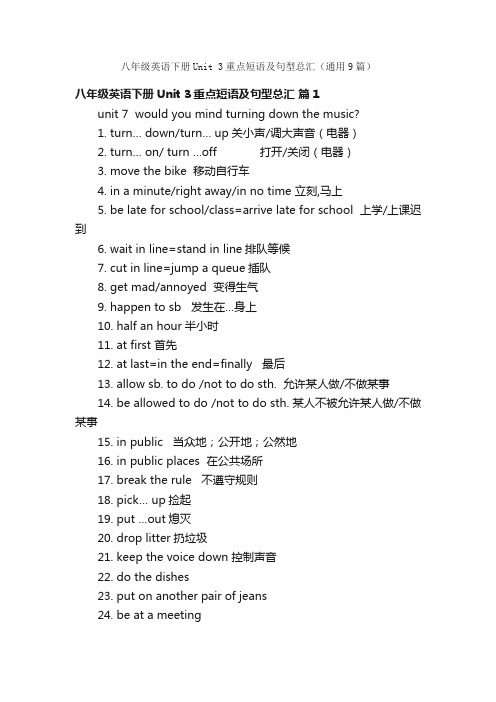
八年级英语下册Unit 3重点短语及句型总汇(通用9篇)八年级英语下册Unit 3重点短语及句型总汇篇1unit 7 would you mind turning down the music?1. turn… down/turn… up关小声/调大声音(电器)2. turn… on/ turn …off打开/关闭(电器)3. move the bike 移动自行车4. in a minute/right away/in no time 立刻,马上5. be late for school/class=arrive late for school 上学/上课迟到6. wait in line=stand in line排队等候7. cut in line=jump a queue插队8. get mad/annoyed 变得生气9. happen to sb 发生在…身上10. half an hour半小时11. at first 首先12. at last=in the end=finally 最后13. allow sb. to do /not to do sth. 允许某人做/不做某事14. be allowed to do /not to do sth. 某人不被允许某人做/不做某事15. in public 当众地;公开地;公然地16. in public places 在公共场所17. break the rule 不遵守规则18. pick… up捡起19. put …out熄灭20. drop litter扔垃圾21. keep the voice down 控制声音22. do the dishes23. put on another pair of jeans24. be at a meeting25. help me in the kitchen26. make some posters27. clothing store28. follow…around29. want to be polite30. stand in the subway door31. cut in line32. stand close to ..33. have different ideas about34. feel uncomfortable35. in all situations36. in public places本单元目标句型:1. would you mind cleaning the yard? 你介意打扫院子吗?2. not at all. i’ll do it right away. 一点也不. 我马上就扫.3. would you mind not playing baseball here. 你介意不要在这打棒球吗?4. would you mind giving me a smaller one?5. sorry, we’ll go and play in the park.对不起,我们到公园去打.6. could you (please) make dinner? 请做晚饭好吗?7. that’s no problem . 没问题.8. could you (please) not feed the dog?=would you mind not feeding the dog?= would you (please) not feed the dog?=please don’t feed the dog, will you?请不要喂狗好吗?9. if you finish these tasks, we can go to a movie tonight.10. your barber gave you a terrible haircut.11. the store clerk gave you the wrong size.12. the waitress brought you the wrong food.13. the pen you bought didn’t work.14. you ordered a hamburger with french fries but only got a hamburger.15. we ask ed some people what annoyed them. here’s what they said.16. i don’t like waiting in line when a shop assistant has a long telephone conversation.17. this happens to me all the time in the school library.18. perhaps in the future i should try not to be so polite.19. the way people behave is different in different cultures and situations.20. sometimes, rules of etiquette are the same almost everywhere.21. we might want to ask someone to behave more politely if we see them breaking a rule of etiquette.22. etiquette means normal and polite social behavior.23. this may seem like a difficult word at first, but it can be very useful to understand.24. in fact, we should also take care not to cough or sneeze loudly in public if possible.25. people don’t usu ally like to be criticized, so we have to be careful how we do this.26. 看到有人抽烟你可以说:could you please put out that cigarette?27. 看到有人乱丢垃圾你可以说:would you mind picking it up?28. 看到有人插对你可以说:sorry, would you mind joining the line?常见动名词、分词的习惯用法总结使用-ing分词的几种情况1.在进行时态中。
知识梳理 人教版英语八下Unit3知识梳理、词汇句式精讲

知识梳理 | 人教版英语八下Unit3知识梳理、词汇句式精讲Unit3 知识梳理【重点短语】1.go out for dinner 出去吃饭2.stay out late 在外面待到很晚3.go to the movies 去看电影4.get a ride 搭车5.work on 从事6.finish doing sth. 完成做某事7.clean and tidy 干净整洁的8.do the dishes 洗餐具9.take out the rubbish 倒垃圾10.fold your/the clothes 叠衣服11.sweep the floor 扫地12.make your/the bed 整理床铺13.clean the livng room 打扫客厅14.no problem 没问题15.welcome sb. 欢迎某人e home from school/work放学/下班回家17.throw down 扔下18.sit down 坐下e over 过来20.take sb. for a walk 带某人去散步21.all the time 一直;总是22.all day/evening 整曰/夜23.do housework 做家务24.shout back 大声回应25.walk away 走开26.share the housework 分担家务27.a comfortable home 一个舒适的家28.in surprise 惊讶地29.get something to drink 拿点喝的东西30.watch one show 观看一个节目31.hang out 闲逛32.pass sb. sth. 把某物传给某人33.lend sb. sth. 把某物借给某人34.get sth. wet 使某物弄湿35. hate to do sth. 讨厌做某事36.do chores 做杂务37.help sb. (to ) d o /with sth•帮助某人干某事38.bring a tent带顶帐篷来39.buy some snacks买些小吃40.go to the store去商店41.invite sb. to a party邀请某人参加聚会42.make sb. do sth. 使某人做某事43.enough stress足够的压力44.a waste of time浪费时间45.in order to为了46.get good grades取得好成绩47.mind doing sth. 介意做某事48.depend on依赖;依靠49.develop children's independence发展孩子的独立性50.look after/take care of 照顾;照看51.do one's part in (doing ) sth. 做某人分内的事【重点句型】1.Could you please clean your room? 你能打扫一下你的房间吗?2. I have to do some work. 我必须干些活。
八年级下册人教版英语unit3知识点
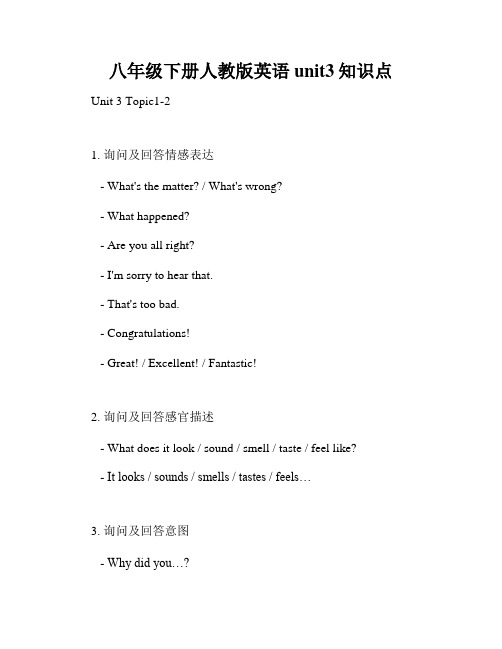
八年级下册人教版英语unit3知识点Unit 3 Topic1-21. 询问及回答情感表达- What's the matter? / What's wrong?- What happened?- Are you all right?- I'm sorry to hear that.- That's too bad.- Congratulations!- Great! / Excellent! / Fantastic!2. 询问及回答感官描述- What does it look / sound / smell / taste / feel like?- It looks / sounds / smells / tastes / feels…3. 询问及回答意图- Why did you…?- What are you going to …?- What do you intend to…?- I intend to… / I plan to…4. 问路及指路,口语表达中熟悉的方向词汇- Excuse me, could you tell me the way to…?- How can I get to…?- The nearest bus stop / subway station / bank / post office is… - It's on the left / right / opposite…Unit 3 Topic 3-41. 表达偏好及兴趣- Would you like…?- What kind of…do you like?- Do you prefer…to…?- I'm into…- I'm fond of…- I enjoy…2. 指出和辨认物品及人物(描述外貌和服装)- What does he / she look like?- He / She has…(描述头发颜色、眼睛、身材特征、穿戴等)3. 询问及描述活动安排- What are you going to do…?- What will you do…?- I'll…4. 描述天气- What's the weather like today?- It's sunny / cloudy / rainy / snowy / windy…- It's hot / warm / cool / cold…Unit 3 Topic 5-61. 表示和理解时间和星期- What time is it?- What's the date today?- What day is it today?- How many days are there in a week?- What do you usually do on weekends?2. 描述行程及活动- Tomorrow, I'm going to…(描述行程)- On Monday / Tuesday / Wednesday…, I usually… - In the morning / afternoon / evening / at night…, I…3. 询问及回答感受- How do you feel?- I feel…(描述感受)4. 描述位置- Where is the…? It's…(描述方位)以上是八年级下册人教版英语unit3的知识点总结,有效巩固这些知识点,可以让你在英语学习中更加得心应手。
人教版八年级英语下册第三单元知识点汇总总结
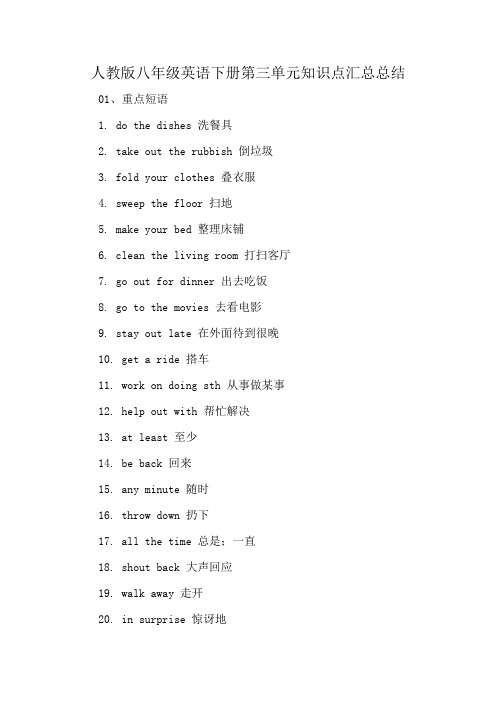
人教版八年级英语下册第三单元知识点汇总总结01、重点短语1. do the dishes 洗餐具2. take out the rubbish 倒垃圾3. fold your clothes 叠衣服4. sweep the floor 扫地5. make your bed 整理床铺6. clean the living room 打扫客厅7. go out for dinner 出去吃饭8. go to the movies 去看电影9. stay out late 在外面待到很晚10. get a ride 搭车11. work on doing sth 从事做某事12. help out with 帮忙解决13. at least 至少14. be back 回来15. any minute 随时16. throw down 扔下17. all the time 总是;一直18. shout back 大声回应19. walk away 走开20. in surprise 惊讶地21. share the housework 分担家务22. a waste of time 浪费时间23. in order to 为了24. depend on 依赖;依靠25. look after/ take care of 照顾26. as a result 结果02、重点句子Grammar Focus 句子1. Could I go out for dinner with my friend?我可以和我的朋友们一起去外面吃晚饭吗?Sure, that should be OK.当然,那没问题。
2. Could we get something to drink after the movie? 看完电影后我们可以喝些东西吗?No, you can't. You have a basketball game tomorrow. 不,你不可以。
人教版八年级英语下册UNIT3整单元知识点汇总
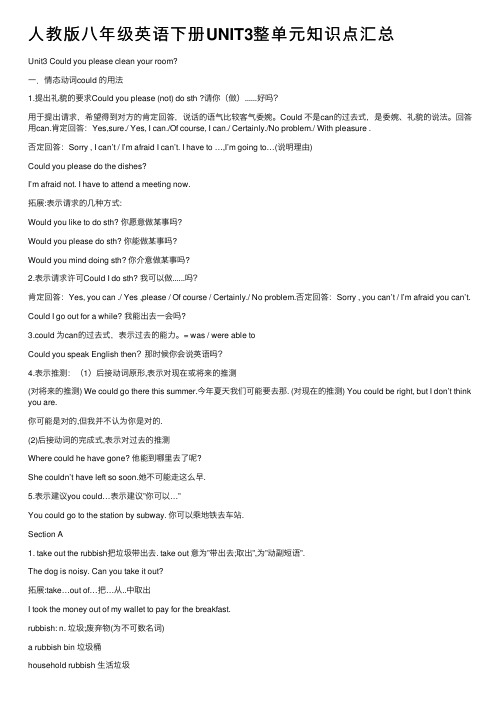
⼈教版⼋年级英语下册UNIT3整单元知识点汇总Unit3 Could you please clean your room?⼀.情态动词could 的⽤法1.提出礼貌的要求Could you please (not) do sth ?请你(做)......好吗?⽤于提出请求,希望得到对⽅的肯定回答,说话的语⽓⽐较客⽓委婉。
Could 不是can的过去式,是委婉、礼貌的说法。
回答⽤can.肯定回答:Yes,sure./ Yes, I can./Of course, I can./ Certainly./No problem./ With pleasure .否定回答:Sorry , I can’t / I’m afraid I can’t. I have to …,I’m going to…(说明理由)Could you please do the dishes?I’m afraid not. I have to attend a meeting now.拓展:表⽰请求的⼏种⽅式:Would you like to do sth? 你愿意做某事吗?Would you please do sth? 你能做某事吗?Would you mind doing sth? 你介意做某事吗?2.表⽰请求许可Could I do sth? 我可以做......吗?肯定回答:Yes, you can ./ Yes ,please / Of course / Certainly./ No problem.否定回答:Sorry , you can’t / I’m afraid you can’t.Could I go out for a while? 我能出去⼀会吗?3.could 为can的过去式,表⽰过去的能⼒。
= was / were able toCould you speak English then?那时候你会说英语吗?4.表⽰推测:(1)后接动词原形,表⽰对现在或将来的推测(对将来的推测) We could go there this summer.今年夏天我们可能要去那. (对现在的推测) You could be right, but I don’t think you are.你可能是对的,但我并不认为你是对的.(2)后接动词的完成式,表⽰对过去的推测Where could he have gone? 他能到哪⾥去了呢?She couldn’t have left so soon.她不可能⾛这么早.5.表⽰建议you could…表⽰建议”你可以…”You could go to the station by subway. 你可以乘地铁去车站.Section A1. take out the rubbish把垃圾带出去. take out 意为”带出去;取出”,为”动副短语”.The dog is noisy. Can you take it out?拓展:take…out of…把…从..中取出I took the money out of my wallet to pay for the breakfast.rubbish: n. 垃圾;废弃物(为不可数名词)a rubbish bin 垃圾桶household rubbish ⽣活垃圾Don’t throw rubbish everywhere.4. sweep the floor扫地,sweep为及物动词,过去式和过去分词均为swept. He pick up the broom to help me sweep the floor.含sweep的常⽤短语:Sweep away 消灭;彻底消除Sweep up 打扫;清扫Sweep out 打扫⼲净;清扫⼲净Sweep aside 对….置之不理;全然⽆视5.floor 名词,地板.Why is my coat on the floor?Floor作名词还可意为”楼层”Our office is on the top floor.注意:在英式英语中the ground floor 指第⼀层,the first floor 指第⼆层.美式英语中,the first floor指第⼀层,the second floor 指第⼆层.9. go to the movies去看电影10. stay out late/ until nine呆到很晚/ 呆到9点钟11. get a ride撘车12. give sb a ride to town开车送某⼈到镇上13. need to do sth需要做……14. have to do sth不得不做……15. help out with a few things帮助做些事情16. could I at least finish watching this show?可以⾄少让我看完这个节⽬吗?at least⾄少,多指数量或程度上的最低限度。
- 1、下载文档前请自行甄别文档内容的完整性,平台不提供额外的编辑、内容补充、找答案等附加服务。
- 2、"仅部分预览"的文档,不可在线预览部分如存在完整性等问题,可反馈申请退款(可完整预览的文档不适用该条件!)。
- 3、如文档侵犯您的权益,请联系客服反馈,我们会尽快为您处理(人工客服工作时间:9:00-18:30)。
Unit 3. Could you please clean your room?一、短语动词1、take out 带出去;取出;拔出;除掉动副词组代词作宾语时必须放在两词之间。
2、come over 固定短语过来,顺便来访,拜访。
后面加介词to,后接表示地点的名词作宾语。
拓展:take out of 把---从---取出/带出3、hang →hung→hung hang out 闲逛;溜达。
4、throw down扔下;随手丢下其中throw可用作及物或不及物动词,意为扔,掷→threw→thrown拓展:throw at向----扔去(带有攻击性)throw to 扔给---(不含恶意)throw away扔掉SectionB1、take care of 照顾;照料。
相当于look after后可接名词、(反身)代词作宾语。
Take good care of相当于look after well2、二、动词用法1、finish 及物动词完成后跟名词、代词或动词ing形式作宾语。
拓展:与finish一样用法的动词或动词短语有:enjoy/look forward to/mind/have fun/practice/be busy/consider/feel like/give up2、pass用作及物动词给;递;pass sb sth =pass sth to sb把某物递给某人。
走过、通过(考试等)作不及物动词,(时间)过去,流逝3、borrow sth from sb向某人借某物。
非延续性动词Lend(lent;lent) sb sth=lend sth to sb借给某人某物。
非延续性动词Keep 由“保存”引申为“借”,延续性动词,可与时间段连用。
四川-----Excuse me,can I_____your pen?-----sorry,I have_____it to Bob.A.borrow;lendB.borrow;borrowedC.lend;borrowedD.lend;lent4、hate及物动词厌恶;讨厌,表示一种感情或心理状态,不能用于进行时态。
Hate sb/sth不喜欢某人或某物Hate to do/doing sth 厌恶做某事(某一次或经常性的)相当于like的用法。
SectionB1、invite及物动词邀请名词invitation 邀请;请帖。
Invite sb to +地点名词。
邀请某人到某地。
Invite sb to do sth 邀请某人做某事。
2、make sb do sth 让某人做某事。
3、动词辨析:单词主语常用结构含义Spend(spent) 人sb spend time/money on sthSb spend time/money doing sthPay(paid) 人sb pay money for sthCost(cost) 物sth cost sb some moneyTake(took) it作形式主语it takes sb some time to do sth四川:-----I_________a lot of time palying computer games everyday. ----oh,boy.it’s bad for your eyes.A.spendB.takesC.pay4、provide sth for sb =provide sb with sth给某人提供某物Offer sb sth =offer sth to sb主动给某人提供某物Offer to do sth 主动提出做某事。
5、depend on依靠;依赖independent独立的independence独立性6、develop作及物动词或不及物动词发展;壮大。
Development 发展。
Developed/developing 前者是发达的后者是发展中的。
7、Have no idea 相当于don't know 不知道8、drop(dropped)→dropping(1)drop意为“丢失或落下”时,既可以作及物动词,也可以作不及物动词。
如:She was scared and dropped the cup.她吓坏了,丢落了茶杯。
The glass dropped from her hand.玻璃从她的手中掉了下来。
(2)drop作动词还有“(价格)下降;放弃”的意思,如:The price of the rice has dropped.大米的价格已经降下来了。
Don't drop math.别放弃数学。
(3)drop也可作名词,表示“滴”,如:A drop of rain fell on my face.一滴雨落在我的脸上。
(4)drop还可指“下跌;落下的距离”,如:There was a sudden drop in the temperature yesterday.昨天气温大幅下降。
拓展:drop behind 落后drop in/by偶然拜访eye drops 眼药水 a drop in the ocean沧海一粟Drop out of school辍学三、名词1、rubbish 不可数名词垃圾,废弃物2、mess名词杂乱;不整洁。
常用短语:in a mess 乱七八糟3、chores 家务可数名词Housework(homework)家务不可数名词SectionB1、stress不可数名词,精神压力;心理负担。
Under the stress of 在---压力之下。
2、waste 名词浪费 a waste of time 浪费时间不可数名词废物;垃圾;浪费作形容词无用的;废弃的;丢弃的。
作及物动词浪费四、形容词五、副词Section B1、anyway 副词而且;加之。
The coat is too expensive and anyway I don’t like the color.还可意为“不管怎样,无论如何,即使这样。
Anyway ,it’s worth trying.The water was cold but he took a shower anyway.六、介词短语1、in front of在---面前;是指在一定范围外。
in the front of 在----前部,是指在一定范围内。
广东中考----why are you standing,Alice?-----I can’t see the blackboard clearly.two tall boys are sitting_________me.A.behindB.next toC.betweenD.in front of2、in surprise 惊讶地;惊奇地,常用作状语。
拓展:to one’s surprise 使某人吃惊的是,常放在句首,作状语。
sectionB1、in order to目的是;为了后接动词原形,引导目的状语。
位置可放在句首,也可放在句中。
否定为:in order not to do.In order that 后面接从句,表示目的,从句中常含有情态动词。
广东:in order _______for the meeting,my sister forced herself to get up early this morning.A.not to be lateB.not being lateC.to be lateD.being late3、as a result 结果;因此拓展:as a result of 由于----;作为------的结果。
七、连词1、the minute意为“一----就----”引导时间状语从句,其后省略了引导词that相当于the moment或as soon as(通常情况下主从句时态要一致。
但若主句用一般将来时,从句则要用一般现在时表将来。
)哈尔滨:boys and girls,calm down and focus on the test paper____you begin to think about the answers.Be confident.you can do it.A.as ifB.as soon asC. although2、 when是at or during the time that, 既指时间点,也可指一段时间;while是during the time that,只指一段时间,因此when引导的时间状语从句中的动词可以是终止性动词,也可以是延续性动词,而while从句中的动词必须是延续性动词。
②when 说明从句的动作和主句的动作可以是同时,也可以是先后发生;while 则强调主句的动作在从句动作的发生的过程中或主从句两个动作同时发生。
③由when引导的时间状语从句,主句用过去进行时,从句应用一般过去时;如果从句和主句的动作同时发生,两句都用过去进行时的时候,多用while引导,如:a. When the teacher came in, we were talking.当此句改变主从句的位置时,则为:While we were talking, the teacher came in.b. They were singing while we were dancing.SectionB1、since 由于;因为;既然,引导原因状语从句,通常放在句首。
还可引导时间状语从句,自---以来。
一般用在完成时当中。
八、特殊句型1、as ---as---与---一样,用于同级比较。
第一个as为副词,后跟形容词或副词的原级;第二个为连词,引导比较状语从句。
否定形式:not as/so ---as---,不如----2、neither+连系动词be/助动词/情态动词+主语----也不。
这是一个倒装句,表示上句否定的情况也同样适合后者。
So+连系动词be/助动词/情态动词+主语----也是。
这是一个倒装句,表示上句肯定的情况也同样适合后者。
拓展:neither+主语+连系动词be/助动词/情态动词----的确不是这样。
(表示说话者同意上文中说话者的否定观点。
)So+主语+连系动词be/助动词/情态动词-----的确是这样。
表示说话者同意上述说话者说出的观点。
福建----last night I didn't watch the TV show。
A Bite of China 2 -----_______did I.I was preparing for today’s test then.A.SoB.EitherC.NeitherSectionB1、do one’s part in (doing ) sth 尽某人的职责做某事。
